New Faculty Join Georgetown College
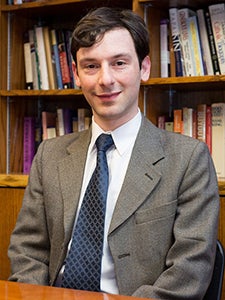 Joshua Cherniss
Joshua Cherniss
Department of Government
Joshua Cherniss, assistant professor of government, is a political theorist working in both the history of political thought and contemporary political theory. Historically, his research focuses heavily on political thought in the 20th century—with occasional visits to the 17th, 18th, and 19th centuries. Thematically, his work revolves around questions central to liberalism—such as the relationship and tensions between individual freedom and the claims of political authority and community, and between the reality and value of diversity and the demand for unity; and on questions of political ethics—such as the conflicting demands made by moral ideals and political realities and responsibilities, the relationship between the ends pursued in political action and the means employed in their pursuit, and the significance of personal character and conduct within politics. His current work re-interprets 20th-century political thought through a reconstruction of the ethical challenges confronting defenders of liberalism, and their reconstruction and redefinition of liberalism as a particular approach to ethics of political action, and a political “ethos”—that is, a set of personal dispositions, sensibilities, patterns of perception, and ways of thinking about the relationship of values to action.
This fall he is teaching a section of Elements of Political Theory (the government department’s required introduction to political theory for government majors); next term he will be teaching a department seminar on ethical problems in political action, and an advanced lecture course on liberal political thought.
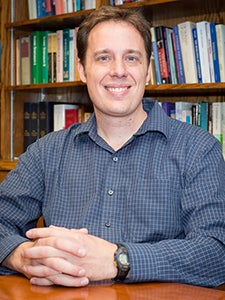 Thomas Coate
Thomas Coate
Department of Biology
Thomas Coate grew up in Northern California then attended college as a biology major at the University of Puget Sound in Tacoma, Washington. In 2008, he was awarded a Ph.D. in cell and developmental biology at the Oregon Health & Science University after completing thesis work on axon guidance and nervous system development. From 2008 to 2014, he worked as a postdoctoral fellow at the National Institute on Deafness and Other Communication Disorders at the National Institutes of Health, where he developed a research program focusing on inner ear neurobiology. His growing laboratory in the biology department in Regents Hall focuses on the molecular mechanisms that organize the nervous system within the inner ear. He will be teaching Sensory Systems (Biol-380) in the fall.
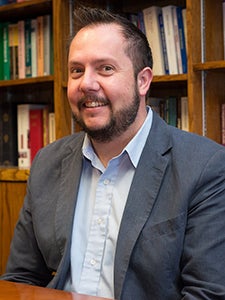 Joe Cunningham
Joe Cunningham
Department of German
Joe Cunningham’s abiding interest in second language acquisition and passion for language teaching grow out of his own language-learning experiences. He has lived, taught, and learned in the United States, Germany, and the Czech Republic. He holds a master’s degree in teaching foreign languages with a specialization in German studies from the Monterey Institute of International Studies and a Ph.D. in German applied linguistics from the University of Kansas. His research explores the interconnectivity of telecollaborative exchange, interlanguage pragmatic development, task-based teaching and learning, and teacher education. This semester he is teaching two courses in the German department’s nationally recognized undergraduate curriculum: Introductory German I and Advanced German I. Joe has enjoyed getting to know his colleagues in foreign languages and linguistics and looks forward to working with them to enrich technology-enhanced language instruction at Georgetown.
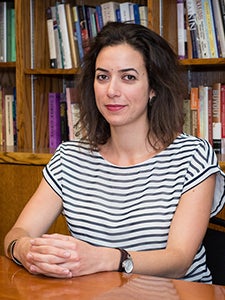 Loubna El Amine
Loubna El Amine
Department of Government
Loubna El Amine is a political theorist with an interest in non-Western traditions of political thought, particularly early Chinese political philosophy. Her book, The Confucian Conception of the Political, will be published in the summer of 2015 by Princeton University Press. She holds a Ph.D. from Princeton University and a bachelor’s degree from the American University of Beirut. She is from Beirut, Lebanon, where she likes to spend her vacation time with family and friends.
She is currently teaching the introductory course in political theory, known as Elements of Political Theory. In the spring, she will teach a course on Classical Chinese Political Thought and a seminar on Human Rights Between East and West, which looks at challenges from Asia and Africa to the Western notion of human rights.
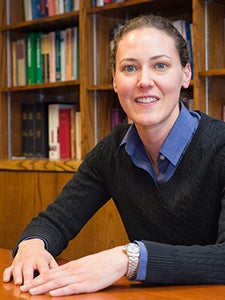 Karah Knope
Karah Knope
Department of Chemistry
Karah E. Knope joined the faculty at Georgetown University in August 2014 as the Clare Boothe Luce Assistant Professor in the Department of Chemistry. She earned her Ph.D. in inorganic chemistry from George Washington University in 2010 and completed her postdoctoral research in the Chemical Sciences and Engineering Division at Argonne National Laboratory (ANL) from 2010 to 2012. Prior to joining the faculty at Georgetown, she held a staff scientist position in the Heavy Elements and Separations Sciences Group at ANL. Her research interests are broadly focused on the synthesis and characterization of f-element materials, an understanding of which has both technologically and environmentally relevant implications.
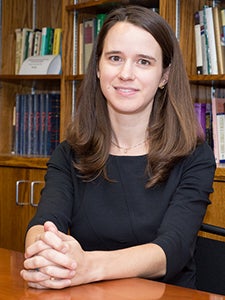 Marden Nichols
Marden Nichols
Department of Classics
Marden Nichols’s research and teaching interests are Latin literature and Roman archaeology. This year, she is teaching Latin language and courses on Cicero and Roman architecture. She has published on Roman satire and comedy, the Latin author Vitruvius, Roman luxury building, and the reception history of classical art in Europe and the United States. Before coming to Georgetown, she was the curator of the antiquities collection at the Walters Art Museum in Baltimore. She has held research fellowships at the British School at Rome, the Metropolitan Museum of Art, and the Center for Advanced Study in the Visual Arts at the National Gallery of Art. She received her Ph.D. from the University of Cambridge, where she was a Marshall scholar.
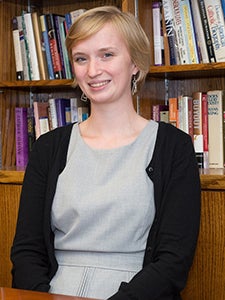 Erin Twohig
Erin Twohig
Department of French
Erin Twohig received her Ph.D. from Columbia University in May 2014. She holds a bachelor’s degree from Middlebury College and a master’s degree from New York University. Her current research focuses on education as a theme in French- and Arabic-language works of literature from Morocco, Algeria, and Tunisia. This fall, she is teaching Intermediate French II and Reading Texts in the French-Speaking World: Culture.
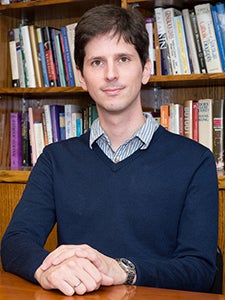 Amir Zeldes
Amir Zeldes
Department of Linguistics
Amir Zeldes is a computational linguist specializing in corpus linguistics. His main area of interest is the syntax-semantics interface, where meaning and knowledge about the world are mapped onto lexical choice and syntactic structure in language-specific ways. He is also very interested in how we learn to be productive in our first, second, and subsequent languages, producing utterances and combinations we have never heard before. He believes that many factors constantly and concurrently influence the choice between competing constructions, which means that we need multifactorial methods in order to understand what it is that we do when we produce and understand language. As part of his research, he has been developing tools for the creation, evaluation, and visualization of multilayer corpora containing a variety of structured annotations, including syntactic-, semantic-, and discourse-level analyses of corpus texts.